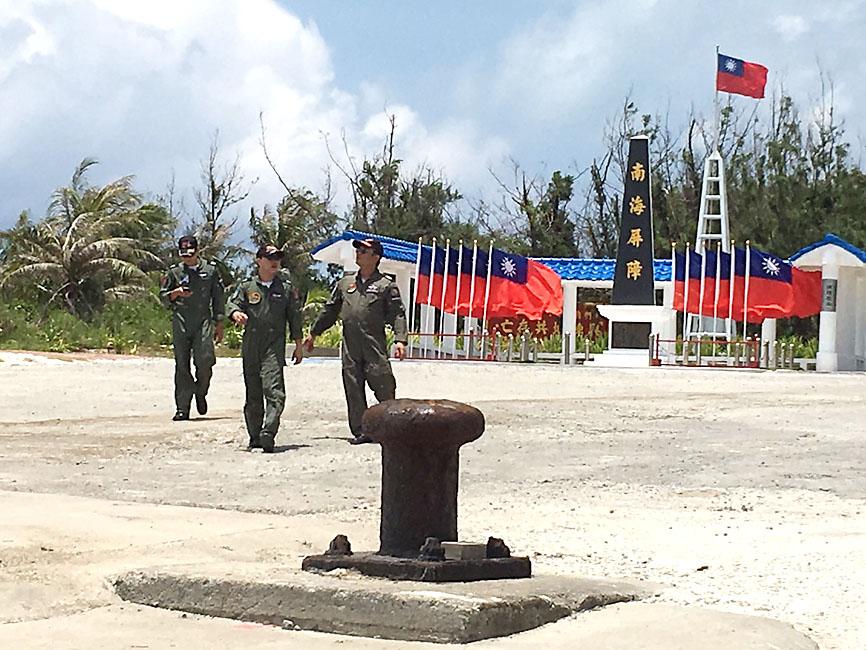The military last week sent “no small number” of Marine Corps officers to the Pratas Islands (Dongsha Island, 東沙群島) following reports of a Chinese People’s Liberation Army (PLA) drill targeting the islands scheduled for this month.
In an interview with Hong Kong’s Bauhinia Magazine published on Saturday last week, PLA National Defense University professor Li Daguang (李大光) confirmed that the Chinese army was planning to stage a simulated invasion of the Pratas Islands in the South China Sea this month.
The islands comprise three atolls, with Pratas Island, at 1.74km2, being the largest. They lie southwest of Taiwan proper in the South China Sea about 444km from the Kaohsiung Harbor.

Photo: CNA
In response, the Ministry of National Defense has stationed a large number of Marine Corps officers on Pratas Island, a source said yesterday.
A contingent of coast guard officers has also been stationed on the island as part of the ministry’s response, the source said, adding that all of the officers were dispatched from Taiwan proper.
The ministry would not comment on the deployment of officers to the island, saying only that it would “respond accordingly to changes in the situation,” while urging the public to remain calm.
Japan’s Kyodo news agency in May first reported about the PLA’s plan to stage a simulated invasion of the islands this month, but China had not confirmed the speculation until Li’s interview.
However, Li did not specify the time or specific location of the planned drill.
The islands initially had a permanently stationed contingent of marines, but the job of protecting them was given to the Coast Guard Administration in 2000.
The Marine Corps’ 99th brigade would now protect the islands jointly with the coast guard in response to the renewed PLA threat, the source said.
The stationing of officers on the island would also serve to relieve coast guard officials who have been monitoring the islands, and would allow them to return to Taiwan proper during their time off, other military sources said.

The Central Election Commission has amended election and recall regulations to require elected office candidates to provide proof that they have no Chinese citizenship, a Cabinet report said. The commission on Oct. 29 last year revised the Measures for the Permission of Family-based Residence, Long-term Residence and Settlement of People from the Mainland Area in the Taiwan Area (大陸地區人民在台灣地區依親居留長期居留或定居許可辦法), the Executive Yuan said in a report it submitted to the legislature for review. The revision requires Chinese citizens applying for permanent residency to submit notarial documents showing that they have lost their Chinese household record and have renounced — or have never

A magnitude 5.6 earthquake struck off the coast of Yilan County at 12:37pm today, with clear shaking felt across much of northern Taiwan. There were no immediate reports of damage. The epicenter of the quake was 16.9km east-southeast of Yilan County Hall offshore at a depth of 66.8km, Central Weather Administration (CWA) data showed. The maximum intensity registered at a 4 in Yilan County’s Nanao Township (南澳) on Taiwan’s seven-tier scale. Other parts of Yilan, as well as certain areas of Hualien County, Taipei, New Taipei City, Taoyuan, Hsinchu County, Taichung and Miaoli County, recorded intensities of 3. Residents of Yilan County and Taipei received

Taiwan has secured another breakthrough in fruit exports, with jujubes, dragon fruit and lychees approved for shipment to the EU, the Ministry of Agriculture said yesterday. The Animal and Plant Health Inspection Agency on Thursday received formal notification of the approval from the EU, the ministry said, adding that the decision was expected to expand Taiwanese fruit producers’ access to high-end European markets. Taiwan exported 126 tonnes of lychees last year, valued at US$1.48 million, with Japan accounting for 102 tonnes. Other export destinations included New Zealand, Hong Kong, the US and Australia, ministry data showed. Jujube exports totaled 103 tonnes, valued at

BIG SPENDERS: Foreign investors bought the most Taiwan equities since 2005, signaling confidence that an AI boom would continue to benefit chipmakers Taiwan Semiconductor Manufacturing Co’s (TSMC, 台積電) market capitalization swelled to US$2 trillion for the first time following a 4.25 percent rally in its American depositary receipts (ADR) overnight, putting the world’s biggest contract chipmaker sixth on the list of the world’s biggest companies by market capitalization, just behind Amazon.com Inc. The site CompaniesMarketcap.com ranked TSMC ahead of Saudi Aramco and Meta Platforms Inc. The Taiwanese company’s ADRs on Tuesday surged to US$385.75 on the New York Stock Exchange, as strong demand for artificial intelligence (AI) applications led to chip supply constraints and boost revenue growth to record-breaking levels. Each TSMC ADR represents